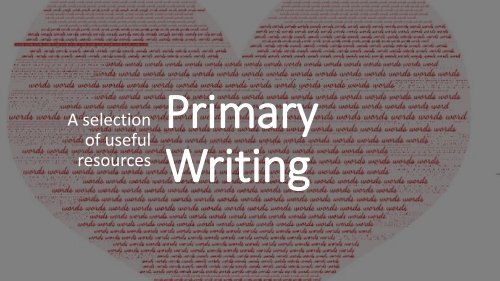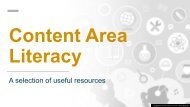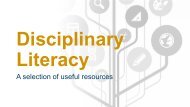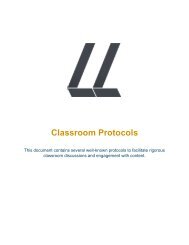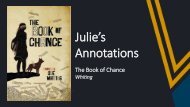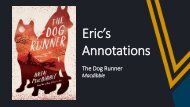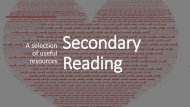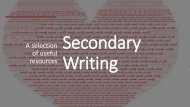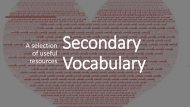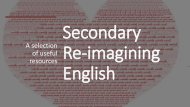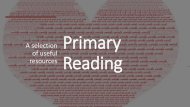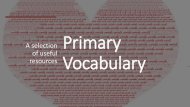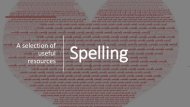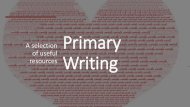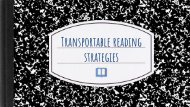Primary - Writing Magazine
Create successful ePaper yourself
Turn your PDF publications into a flip-book with our unique Google optimized e-Paper software.
A selection<br />
of useful<br />
resources<br />
<strong>Primary</strong><br />
<strong>Writing</strong>
Through strategic routines, tips, advice, and resources, as<br />
well as short, focused video clips, teachers can create the<br />
sights and sounds of a thriving writing workshop in their F-6<br />
classrooms where:<br />
• Students spend most of their time writing-not just<br />
learning about it<br />
• Student choice is encouraged to help create<br />
engaged writers<br />
• Students are part of the formative assessment<br />
process, managing their own growth as writers<br />
• Students will look forward to writing<br />
There are explanations of writing process, writing traits,<br />
small-group strategy lessons and minilessons about the craft<br />
of being a writer.<br />
This book is a great introduction to the writing workshop. It<br />
provides examples of what the teacher and students should<br />
be doing in each part of the workshop and gives practical<br />
activities for teachers who are new to writing workshop.<br />
2019
This book shows teachers how to transform the Writer's Notebook from just<br />
a place to write stuff down, to a vital, constantly evolving tool for each<br />
individual child. From notebook set up, tips, lessons and questions of<br />
whether to evaluate the notebook, Buckner gives teachers a lot to<br />
consider.<br />
Teacher questions Buckner addresses include:<br />
• How do I launch the notebook?<br />
• What mini-lessons can be used throughout the year to help<br />
students become more skilled in keeping notebooks?<br />
• How do I help students who are stuck in writing ruts with<br />
notebooks?<br />
• How do I help students use their learning from notebooks for other<br />
writing?<br />
• How do I organise notebooks so that the design is flexible, yet still<br />
allows students to access information easily?<br />
• How can writers' notebooks help students become better readers?<br />
• How do I assess notebooks?<br />
2005
A valuable resource for developing and maintaining a writing<br />
workshop in the classroom.<br />
The authors lay out each step in the writing workshop process,<br />
including strategies, ideas and the foundational classroom<br />
principles necessary for incorporating successful writing<br />
workshops into each student’s daily schedule.<br />
Each chapter details how a specific component of the writing<br />
workshop looks, functions, and taught.<br />
Areas include:<br />
• the time and space required.<br />
• short-term goals for the workshop<br />
• how to launch the workshop with students<br />
• what conferring with writers looks like<br />
• how to incorporate literature in the workshop<br />
• what skills to teach<br />
• how to assess and evaluate.<br />
2001
This book has 300 effective strategies for teaching. They have<br />
been grouped beneath 10 crucial goals. This book supports<br />
teachers to<br />
• provide students step-by-step strategies for writing with<br />
skill and craft<br />
• coach writers using prompts aligned to a strategy<br />
• present mentor texts that support a genre and strategy<br />
• adjust instruction to meet individual needs<br />
• demonstrate and explain a writing move<br />
• provide feedback to young writers<br />
There are suggestion for stocking your writing center, planning<br />
units of study, celebrating student writing, keeping records ideas<br />
for anchor charts and examples of student work.<br />
2017
This book explores the teaching practice of interactive<br />
writing and is specifically focused on the early phases of<br />
writing. In a clear, step-by-step format, the authors show<br />
how teachers can use interactive writing to teach a range of<br />
foundational literacy skills by sharing the pen with young<br />
writers.<br />
Important features include a rich array of examples of<br />
children's writing, down-to-earth practical advice,<br />
suggestions for using children's literature and art in the<br />
writing program, numerous photos of children's work, and<br />
suggestions for professional development.<br />
The book is filled with practical information on how to get<br />
started with interactive writing, with explicit details from<br />
specific materials to fine teaching points.<br />
2018
This expanded edition enables teachers to construct a<br />
common vision for student achievement that effectively<br />
and efficiently engages all students in the robust,<br />
authentic and meaningful literacy learning.<br />
It also provides a way to look for specific evidence of<br />
learning from kindergarten through grade eight, and<br />
across eight instructional contexts.<br />
2016
This book shows you how to assess and teach writing in a way that’s<br />
practical and achievable. It focuses on processes for teachers to develop<br />
their student writers:<br />
• first read the writing<br />
• assess it using the traits of writing<br />
• teach the writers and guide revision decisions using traits as a<br />
common language and map<br />
Part 1 walks you through the traits of writing and their key qualities,<br />
showing step by step how to read students’ writing and offer feedback that<br />
nudges them forward through the revision process.<br />
Part 2 focuses on instruction, offering specific guidance for how to use<br />
what you’ve learned from reading student writing to design lessons that<br />
scaffold students toward making their own craft decisions and revisions. In<br />
addition, there’s an entire chapter devoted to mentor texts that you can use<br />
to model traits and key qualities for your students.<br />
2018
This book introduces each trait in depth. It examines samples of<br />
students writing looking for evidence of the traits.<br />
This would be a useful book study to build teacher knowledge of<br />
each of the traits.<br />
It is designed for teachers up to year 3.<br />
2005
This book introduces each trait in depth. It examines samples of<br />
students writing looking for evidence of the traits.<br />
This would be a useful book study to build teacher knowledge of<br />
each of the traits.<br />
It is designed for teachers of years 3 - 6<br />
2007
This book introduces each trait in depth. It examines samples of<br />
students writing looking for evidence of the traits.<br />
This would be a useful book study to build teacher knowledge of<br />
each of the traits.<br />
It is designed for teachers of years 5 - 8<br />
2010
Helps teachers ensure that each student finds his or her<br />
path to meeting their learning goals.<br />
Serravallo’s four-step protocol leads teacher towards<br />
goal-directed instruction:<br />
• collect the data<br />
• analyse the data<br />
• synthesise data<br />
• develop instructional plans<br />
• follow-ups to monitor progress.<br />
Designed for Grades 3-6<br />
2013
Helps teachers ensure that each student finds his or her<br />
path to meeting their learning goals.<br />
Serravallo’s four-step protocol leads teacher towards<br />
goal-directed instruction:<br />
• collect the data<br />
• analyse the data<br />
• synthesise data<br />
• develop instructional plans<br />
• follow-ups to monitor progress.<br />
Designed for Grades F-2<br />
2014
This book includes five specific units of study for your writing<br />
workshop that help students prepare thoughtfully to write.<br />
The units also help children to differentiate the planning and<br />
organization needed to write fiction, personal narrative,<br />
nonfiction, Q & A books and pattern books.<br />
Each unit is concise, logically laid-out descriptions of how each<br />
unit of study operates, a variety of helpful tables, charts, and<br />
assessment diagnostics, as well as elaborations, teaching<br />
points for minilessons and conferences, troubleshooting tips,<br />
and month-by-month planning assistance.<br />
2005
This book includes five specific units of study for your<br />
writing workshop that help students prepare thoughtfully to<br />
write.<br />
Each type of writing has a different purpose and audience<br />
and the units of study include concise, logically laid-out<br />
descriptions of how each one operates, a variety of helpful<br />
tables, charts, and assessment diagnostics, as well as<br />
elaborations, teaching points for minilessons and<br />
conferences, troubleshooting tips, and month-by-month<br />
planning assistance.<br />
2007
A teacher plays a pivotal role in any effective<br />
school writing program and at every year level.<br />
This book is a passionate portrayal of the journey<br />
teachers go on when they decide to write for and<br />
with their young writers.<br />
Alan takes you through the approach of modelling<br />
and demonstrating writing for students as they<br />
struggle and learn from the challenges, and joys, of<br />
becoming confident writers and communicators.<br />
When your students see that writing is something<br />
you do too, a sense of community is created in the<br />
classroom and you become more credible as a<br />
teacher of writing. The results are happier, more<br />
resourceful students who aren't turned off by the<br />
idea of writing, and benefits that can be seen in all<br />
subjects involving literacy.<br />
2011
This book focuses on building teacher capacity to name<br />
and notice the strengths in student writing.<br />
Bomer discusses the importance of the admiring lens and<br />
provides advice on giving effective feedback to students<br />
including:<br />
• spot hidden stylistic gems in writing that is<br />
unconventional or vernacular<br />
• uncover content and organizational gems even when<br />
you don't find the subject matter engaging or<br />
significant<br />
• respond by naming and celebrating writers' gems<br />
instead of hunting for mistakes<br />
• Give feedback using the inspiring language of<br />
published writers that motivates students to keep<br />
writing, revising, and polishing their gems.<br />
2010
In this book Anderson explores the different paths a<br />
writing conference can take and gives teachers advice<br />
for making these useful for the writer including:<br />
• how to get started with conferring, or<br />
improve your existing conferences<br />
• how to use conferences to meet the diverse<br />
needs of your student writers<br />
• how to fit conferences into your busy writing<br />
workshop schedule.<br />
The book includes links to high quality videos that<br />
would be excellent PD for any group of teachers<br />
wanting to learn more about teaching and conferring<br />
with writers.<br />
2018
This book looks at how teachers can get beginning<br />
writers creating books from their very first week at<br />
school!<br />
It includes links to videos and has lots of food for<br />
thought about setting beginning writers up for<br />
success.<br />
2018
Authors Judy Davis and Sharon Hill are two expert<br />
teachers who have lived the teaching of writing from<br />
inside the classroom. This book is a guide packed with<br />
practical ideas, tools and thoughtful strategies for your<br />
classroom.<br />
There are several units of study included.<br />
Davis and Hill help teachers prepare tools, address<br />
management issues, get the work started, and build<br />
momentum as students increase their understanding of<br />
good writing practice.<br />
2003
This book is organized around six writing genres, more<br />
than fifty mini-lessons deal with specific skills that help<br />
students write effective fiction and nonfiction in such<br />
genres as:<br />
• Personal memoir<br />
• Fictional narrative<br />
• Informational report<br />
• Persuasive writing<br />
• Procedural writing<br />
• Poetry<br />
• The concluding chapter pulls all the threads<br />
together with a multi-genre project that involves<br />
students in using the skills they have learned<br />
throughout the school year<br />
The book also offers chapters devoted to the writing<br />
process, writing workshop, and using rubrics for<br />
instruction and assessment using the 6 Traits.<br />
2010


